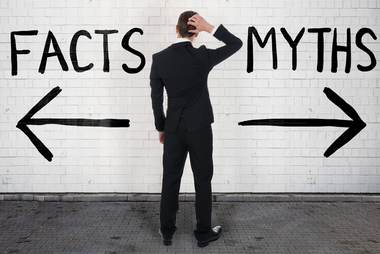Estate planning is about defining and living out your legacy both during your lifetime and after you are gone. A well-drafted estate plan can give you peace of mind that the people and organizations you support are well cared for. Yet there are a lot of myths that still need debunking:
Myth #1: Estate planning is only for the wealthy.
There is a common belief that estate planning is necessary for multimillionaires only. If you own property and assets or have loved ones that depend on you to provide for their income or care, you will need some sort of estate plan! Basically, if you have money, real estate or a comic book collection, you have an estate. Use estate planning tools like a will or a trust to protect your spouse, minor children or other dependents.
Myth #2: Estate planning is only about distributing your assets after you’re gone.
Of course your estate plan will address who gets your things after your are gone. But these documents can also include charitable planning goals and gifting strategies while you are alive. You also need to prepare for unexpected events, like naming someone to manage your finances if you become incapacitated, or naming a guardian for your children if you pass away.
Myth #3: A will oversees the distribution of all your assets.
Some assets — life insurance policies and qualified retirement assets like 401(k)s and IRAs, for example — may technically not be covered by your will. A will does not override all your beneficiary designations. The attorneys at Rochford Langins Jarstad review beneficiary designations with our clients make sure to update an IRA account to your new spouse, for instance.
Other important legal documents include a power of attorney (naming someone to make legal or financial decisions on your behalf if you cannot), a healthcare directive (naming someone to make medical decisions), a living will and a trust.
Myth #4: An estate plan is a once-and-done event.
Once your estate plan is in place, it is not over. Your preferences and goals will change over time. Laws change. Tax rates are adjusted. You rethink your charitable strategies. You may marry or divorce or welcome a new child or grandchild. Your little ones become adults. Or you may move to another state — all reasons to revisit your plan.
Myth #5: Taxes eat up the lion’s share of any estate.
Estate taxes are real and the rates are quite high (topping out at 40%)! In Minnesota in 2021, only individuals with more than $3 million in their estate are subject to estate taxes. Individuals are only changed a federal estate tax if they own at least $11.7 million! Though these numbers are high, remember that the value of your assets can add up quickly and includes real estate, life insurance policies, retirement accounts, and bank accounts!
Myth #6: None of this matters anyway — I’m too young to need a will.
This is one of the biggest myths of all! First of all, even individuals without a spouse or children should make provisions for how his worldly goods will be disposed of after he is gone. And if your situation changes later, you will already have a template in place. Even if you don’t have close family, you may want to leave your assets to a meaningful charity.
Contact the attorneys at Rochford Langins Jarstad today to help you create an estate plan that’s right for you.

